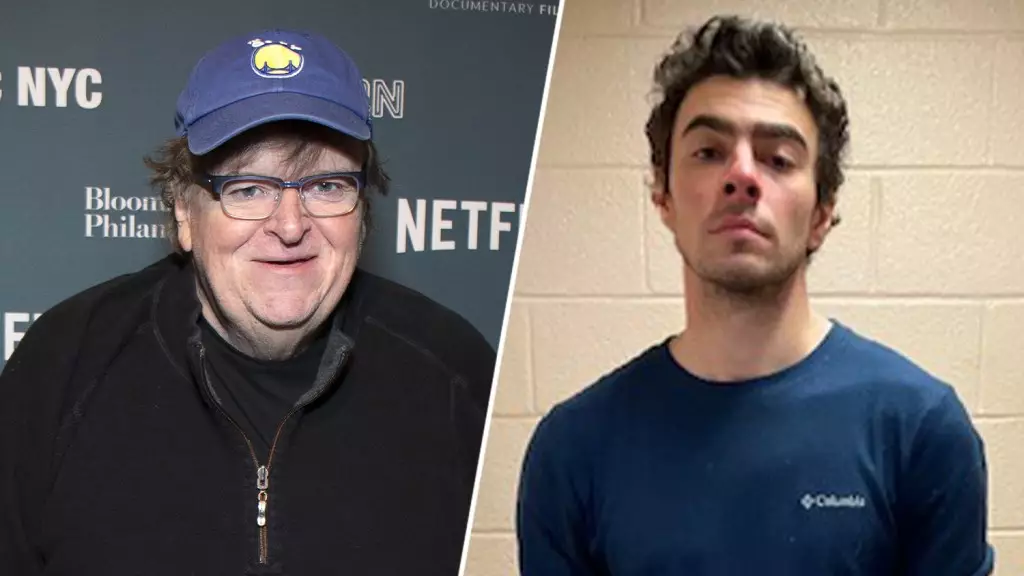The recent killing of UnitedHealthcare CEO Brian Thompson has stirred a national conversation on the intricacies of healthcare in America. The arrest of Luigi Mangione, the alleged shooter, added an unexpected layer to the discourse, particularly as he appears to have drawn inspiration from Michael Moore, the renowned documentary filmmaker. In a climate where public outrage is palpable, Moore’s open letter addressing Mangione’s manifesto forms a crucial reflection on the pervasive anger toward the healthcare industry, which he deems justified. This tragedy has catapulted healthcare discussions into the public eye, raising questions of morality, social justice, and the human costs of profit-driven medical care.
Moore’s assertion that the anger following Thompson’s murder is “1000% justified” resonates deeply with a public weary of having to navigate a convoluted healthcare system that often prioritizes profitability over patient welfare. In a country where millions are uninsured or underinsured, the emotional and physical toll of the healthcare industry has become increasingly evident. He highlights the cascading effects of medical debt, denied claims, and the attendant bankruptcies that can arise from the very system meant to safeguard public health. This sentiment taps into a broader narrative in American society, where the struggle for access to basic healthcare services often feels like a battle against an impenetrable wall of corporate interests.
By framing the situation as a case of “RICH ON RICH crime,” Moore critiques the socio-economic disparities that give rise to such tragic confrontations. The notion that both victims and perpetrators in this context belong to affluent social strata calls into question the broader implications of wealth and power in the healthcare debate. It is not simply a tale of an unspeakable act of violence but rather a reflection of systemic inequities that have gone unchallenged for too long. While the act of killing is indefensible, Moore directs attention to the larger ramifications of a system that has failed to deliver essential care to those in need.
A Call for Compassion
In his correspondence, Moore makes it clear that he abhors the act of murder, emphasizing that there is no justification for violence. He demarcates between righteous anger toward the healthcare industry and the misguided actions of individuals like Mangione. “No one should die because they don’t ‘have’ health insurance,” he asserts passionately, igniting a moral imperative to seek reform. This duality of emotive responsibility highlights a critical point: While acknowledging widespread discontent, he simultaneously calls for restraint and rationality in advocating for reform.
This notion of compassionate anger serves as a plausible avenue for change. Rather than succumbing to violence, Moore encourages a collective movement toward reform in healthcare, underscoring that systemic change can be accomplished through political discourse, advocacy, and community organizing. By leveraging his platform and previous films, like “Sicko,” he offers audiences insights into the underlying issues plaguing the healthcare system and the importance of striving for a more humane approach to medical care.
The aftermath of Thompson’s assassination presents an opportunity, albeit a grim one, for society to engage in a real and poignant discussion about the future of healthcare in America. Acknowledgeably, the anger stemming from such incidents should not be stifled but rather harnessed as a catalyst for policy changes that reflect the needs of the populace.
Media narratives surrounding healthcare often gloss over personal stories and experiences, relegating them to mere statistics. Moore challenges this tendency by reminding us that the anger associated with the healthcare crisis is tied to personal suffering—a plea for recognition of those who have faced the devastating ramifications of insurance denial and lack of access. He implies that understanding the stories of real individuals could yield a transformation in how healthcare policies are shaped.
In the wake of this tragedy, we find ourselves at a crossroads, grappling with complex emotions surrounding the healthcare crisis in America. While the outpouring of anger at the industry is understandable, it must be channeled into constructive discourse rather than violence. As Moore aptly states, no one should die for lack of insurance or inadequate care. Moving forward, it is imperative that we cultivate anger into meaningful dialogue and concerted action that prioritizes human life over corporate profits, ensuring that healthcare becomes a right rather than a privilege.


Leave a Reply